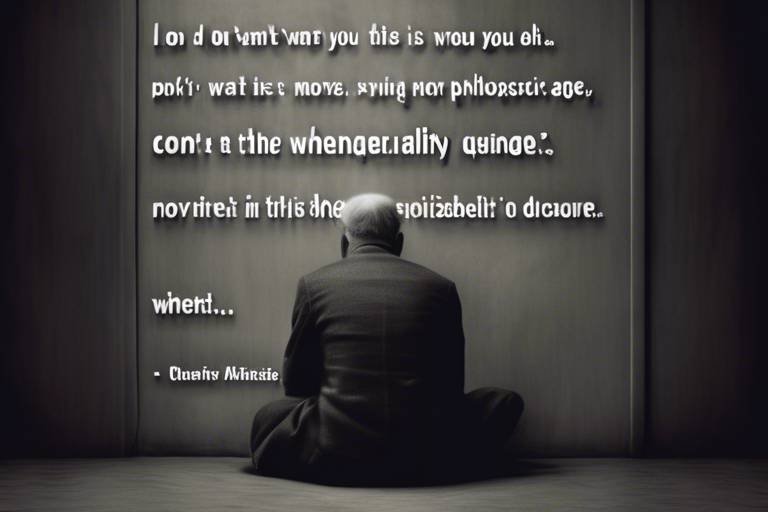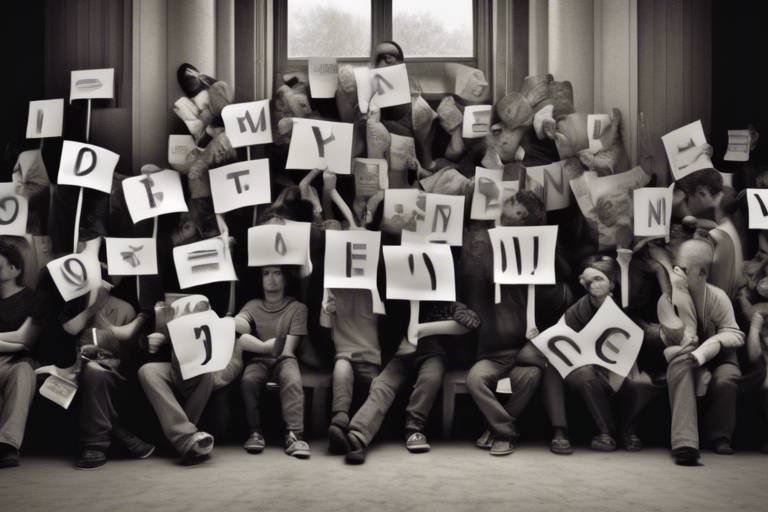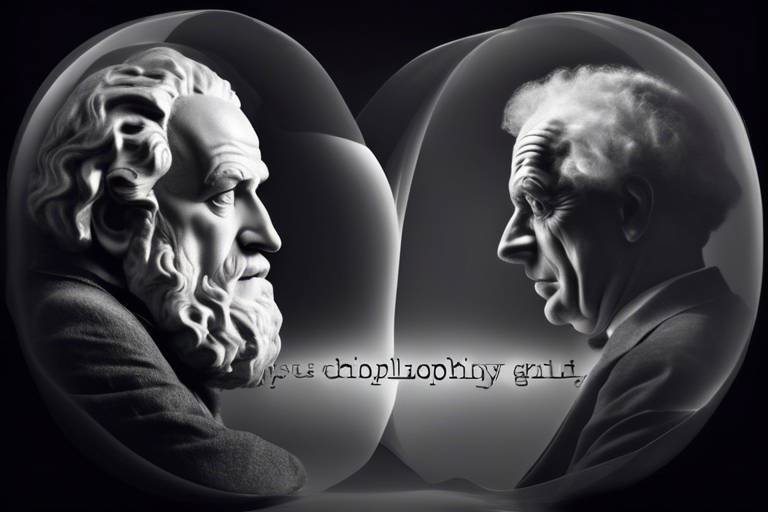The Philosophy of Free Speech
Free speech is not just a legal concept; it's a fundamental pillar of democratic societies, shaping how individuals interact, express their ideas, and challenge the status quo. In a world where opinions can ignite revolutions or foster understanding, the philosophy of free speech dives deep into the essence of what it means to communicate freely. It raises profound questions: What should we be allowed to say? Are there limits to our expression? And, most importantly, what happens when the right to speak freely clashes with the rights of others? These questions resonate throughout history, philosophy, and even our daily lives, making the exploration of free speech both timely and critical.
As we unravel the layers of this complex topic, we'll discover that free speech is not merely about the right to express oneself; it's about the responsibility that comes with that freedom. It's about understanding the impact our words can have on others and recognizing that the ability to speak freely also carries the weight of accountability. This duality is what makes the philosophy of free speech so rich and, at times, contentious.
In this article, we will journey through the historical context of free speech, examining its evolution and the influential thinkers who have shaped our understanding of this concept. We'll delve into theoretical foundations, exploring the philosophical arguments that advocate for free expression, including the perspectives of John Stuart Mill. His insights, particularly the Harm Principle, will guide us in understanding when speech should be curtailed and when it should be celebrated.
Moreover, we will navigate contemporary debates surrounding free speech, particularly in the age of social media, where the lines between expression and harm can often blur. As technology advances, so too do the challenges and opportunities for dialogue, making it essential to consider how our digital landscape influences our understanding of free speech.
Ultimately, the philosophy of free speech is a living discourse, one that requires constant reflection and adaptation. By examining the legal frameworks that govern speech across different cultures and countries, as well as the future trends that may shape this ongoing conversation, we can better appreciate the vital role free expression plays in our lives. So, let’s embark on this exploration of free speech—its history, its theories, and its implications for our society today.
- What is free speech? Free speech is the right to express one's opinions and ideas without fear of government retaliation or censorship.
- Are there limits to free speech? Yes, most legal frameworks recognize limits, especially when speech incites violence, constitutes hate speech, or poses a direct threat to others.
- How does technology impact free speech? Technology, particularly social media, has broadened the platforms for expression but also raised concerns about misinformation and censorship.
- What is the Harm Principle? Proposed by John Stuart Mill, the Harm Principle suggests that free speech should only be limited to prevent direct harm to others.

The Historical Context of Free Speech
Understanding the evolution of free speech throughout history is akin to tracing the roots of a mighty tree. Each branch represents a significant milestone, while the leaves symbolize the diverse thoughts and ideas that have flourished under the sun of liberty. From ancient civilizations to modern democracies, the journey of free speech has been tumultuous, marked by struggles, victories, and ongoing debates that shape our understanding of individual rights today.
In ancient Greece, the seeds of free speech were sown in the fertile soil of democracy. Philosophers like Socrates and Aristotle championed the idea that open dialogue was essential for personal and societal development. They believed that through reasoned debate, individuals could arrive at truth. However, this ideal was often at odds with the realities of governance, as seen in the trial and execution of Socrates, who was accused of corrupting the youth and impiety.
Fast forward to the Enlightenment era, where thinkers such as Voltaire and Rousseau further propelled the discourse on free speech. Voltaire famously declared, “I disapprove of what you say, but I will defend to the death your right to say it.” This sentiment encapsulated the emerging belief that freedom of expression was not just a privilege but a fundamental human right. The American Revolution and the subsequent drafting of the First Amendment in the United States Constitution marked a significant turning point, enshrining free speech as a cornerstone of democracy.
However, the journey was not without its challenges. The Alien and Sedition Acts of 1798 exemplified the tension between free expression and national security, as the government sought to silence dissent during a time of political turmoil. This conflict laid the groundwork for ongoing debates about the limits of free speech, a theme that resonates through history to this day.
As we moved into the 20th century, the civil rights movement in the United States brought the issue of free speech to the forefront once again. Activists like Martin Luther King Jr. used the power of oratory to challenge systemic oppression and advocate for equality. This period underscored the idea that free speech is not merely about individual expression but is also a vital tool for social change.
Globally, the post-World War II era saw the establishment of the Universal Declaration of Human Rights in 1948, which recognized the right to free speech as a fundamental human right. This declaration was a response to the atrocities of war and a commitment to ensuring that individuals could express themselves without fear of persecution.
In examining the historical context of free speech, it becomes evident that its significance extends beyond mere words. It is intertwined with the fabric of society, influencing the development of democratic principles and individual rights. As we continue to navigate the complexities of free expression in our modern world, it is crucial to reflect on this rich history, recognizing that the battles fought for free speech have paved the way for the liberties we enjoy today.
- What is the origin of free speech? Free speech has its roots in ancient Greece, where philosophers emphasized the importance of open dialogue.
- How has free speech evolved over time? From the Enlightenment to modern democracies, free speech has undergone significant changes, influenced by historical events and social movements.
- What are some key milestones in the history of free speech? Important milestones include the drafting of the First Amendment in the U.S., the Universal Declaration of Human Rights, and landmark Supreme Court cases.

Theoretical Foundations of Free Speech
When we dive into the , we uncover a rich tapestry of ideas that have shaped our understanding of this fundamental right. At its core, free speech is not just about the ability to express oneself; it is intertwined with the very fabric of democracy and individual autonomy. Various philosophical theories provide a framework for understanding why free speech is essential and how it should be protected. Three prominent theories stand out: liberalism, utilitarianism, and the marketplace of ideas.
Liberalism posits that individual rights, including the right to free expression, are paramount. Thinkers like John Locke and John Stuart Mill championed the idea that freedom of speech is a natural right that should be protected against government interference. They believed that allowing individuals to express their thoughts freely fosters a society where ideas can be debated, refined, and ultimately lead to societal progress. This concept is beautifully illustrated by the analogy of a garden: just as a garden flourishes with diverse plants, society thrives when a variety of opinions can coexist and compete.
On the other hand, utilitarianism offers a different perspective. This theory, primarily associated with philosophers like Jeremy Bentham and John Stuart Mill, suggests that the best action is the one that maximizes overall happiness or utility. From this viewpoint, free speech is justified because it leads to greater societal well-being. When people are allowed to express their thoughts and opinions, it enables the exchange of ideas, which can lead to better decision-making and societal outcomes. However, utilitarianism also raises questions about the limits of free speech: if an expression causes more harm than good, should it still be protected?
Another critical framework is the marketplace of ideas, a metaphor popularized by Justice Oliver Wendell Holmes. This theory suggests that the best way to discern truth is through the free exchange of ideas, much like a marketplace where various products compete for consumers' attention. In this analogy, the strongest ideas will prevail, while weaker ones will fade away. However, this concept assumes that all voices have equal access to the marketplace, which is often not the case in reality. Power dynamics, socioeconomic status, and systemic inequalities can skew this marketplace, leading to a debate on whether additional protections are necessary for marginalized voices.
As we explore these theories, it becomes clear that they do not exist in isolation. They often intersect and inform one another, creating a complex landscape where free speech is both celebrated and scrutinized. The balance between protecting free expression and addressing potential harms is a delicate one, requiring ongoing dialogue and reflection. This is especially pertinent in our current age, where the rapid spread of information and misinformation through digital platforms complicates the discourse surrounding free speech.
In summary, the theoretical foundations of free speech are robust and multifaceted. They invite us to consider not just the right to speak, but also the implications of that speech in a diverse society. As we navigate the challenges of modern communication, these foundational theories will continue to guide our understanding of free expression and its role in fostering a healthy, democratic society.
- What is the importance of free speech? Free speech is crucial for democracy, allowing individuals to express their thoughts, challenge authority, and participate in societal discourse.
- Are there limits to free speech? Yes, while free speech is a fundamental right, it can be limited in cases of hate speech, incitement to violence, or when it poses a direct threat to others.
- How does technology impact free speech? Technology, especially social media, has transformed how free speech is expressed, leading to new challenges regarding misinformation and censorship.

John Stuart Mill's Perspective
When we dive into the realm of free speech, we can't overlook the profound insights of John Stuart Mill, a 19th-century philosopher whose ideas still resonate today. Mill was a staunch advocate for individual liberty and believed that free expression was not just a right but a fundamental necessity for societal progress. Imagine a world where only one opinion is heard—how stagnant would our ideas become? Mill argued that the clash of differing views is what fuels intellectual and social growth. He famously stated, "He who knows only his own side of the case knows little of that." This highlights the importance of engaging with diverse perspectives, as it enriches our understanding and fosters a more vibrant society.
Mill's perspective on free speech is rooted in the belief that all ideas, even those that are unpopular or controversial, should be allowed to circulate. He believed that through open discourse, society can distinguish between truth and falsehood. This process is akin to a marketplace where ideas compete; the strongest and most truthful ideas will prevail, while weaker ones will be discarded. Mill's vision is not just about protecting the right to speak but also about the necessity of listening to others, even if their views challenge our own.
However, Mill was not naive about the potential dangers of free speech. He recognized that some expressions could be harmful, leading to societal discord or personal injury. This brings us to one of his most significant contributions to the discussion of free speech: the Harm Principle. According to this principle, the only time free speech should be curtailed is when it poses a direct threat of harm to others. This nuanced approach attempts to balance the freedom to express oneself with the responsibility to avoid causing injury. It raises an essential question: where do we draw the line between harmful speech and the right to express one's thoughts?
Mill's ideas have sparked a great deal of debate, particularly when it comes to the complexities of social power dynamics. Critics argue that while Mill's framework is well-intentioned, it may overlook the realities of how speech can perpetuate inequality and marginalization. For instance, unrestricted speech can sometimes lead to the amplification of hate speech, which can have devastating effects on vulnerable communities. This ongoing conversation about free speech and its limits is crucial as we navigate the challenges of modern discourse.
In summary, Mill's perspective on free speech is a powerful reminder of the value of open dialogue in a democratic society. His emphasis on the importance of diverse opinions and the careful consideration of the Harm Principle provides a robust framework for understanding the complexities of free expression. As we continue to grapple with the implications of free speech in our increasingly polarized world, Mill's insights remain a vital touchstone for discussions about liberty, responsibility, and the quest for truth.
- What is the Harm Principle? The Harm Principle, proposed by John Stuart Mill, states that free speech should only be limited if it directly harms others.
- Why is Mill's perspective on free speech still relevant today? Mill's ideas encourage open dialogue and critical engagement with diverse viewpoints, which are essential in today's polarized society.
- How does Mill address the issue of hate speech? While Mill advocates for free expression, he acknowledges that speech can be harmful and should be curtailed if it poses a direct threat to individuals or communities.

Mill's Harm Principle
John Stuart Mill's Harm Principle is a fundamental concept in the discourse surrounding free speech, providing a vital framework for understanding when limitations on expression are justified. At its core, the Harm Principle posits that the only legitimate reason to restrict an individual's freedom of speech is to prevent direct harm to others. This principle serves as a beacon for advocates of free expression, emphasizing that the marketplace of ideas thrives when diverse opinions are allowed to flourish. Mill believed that silencing an opinion is a grave injustice, as it deprives society of the opportunity to engage in meaningful discourse and discover truth.
To elaborate, Mill argued that the pursuit of truth is a collective endeavor. When voices are silenced, society risks stagnation, unable to progress or evolve. He famously stated, "If all mankind minus one were of one opinion, mankind would be no more justified in silencing that one person than he, if he had the power, would be justified in silencing mankind." This highlights the inherent value of every individual’s perspective, regardless of how unpopular or controversial it may be.
However, the application of the Harm Principle is not without its complexities. Mill's framework suggests that we must carefully consider what constitutes "harm." In a society where power dynamics are often skewed, the potential for speech to perpetuate inequality or marginalization raises critical questions. For instance, hate speech directed at vulnerable communities can lead to real, tangible harm, challenging the simplistic application of Mill's principle. Therefore, while Mill advocates for an open forum of ideas, it is essential to acknowledge that certain forms of expression can indeed inflict harm on individuals and communities.
In practical terms, the Harm Principle invites us to consider a few key questions:
- What constitutes direct harm in the context of free speech?
- How do we balance the need for open dialogue with the responsibility to protect marginalized groups?
- Can we draw clear lines between harmful speech and mere offensive opinions?
As we navigate these questions, it becomes evident that Mill's Harm Principle is not just a call for unrestricted speech but a nuanced invitation to engage in thoughtful, critical discussions about the implications of our words. In a world where the stakes are high and the consequences of speech can be profound, Mill's principle remains a cornerstone of the ongoing debate about the boundaries of free expression.
What is the Harm Principle?
The Harm Principle, articulated by John Stuart Mill, states that the only justifiable reason to limit someone's freedom of speech is to prevent direct harm to others. It emphasizes the importance of allowing diverse opinions to thrive in society.
How does the Harm Principle apply to hate speech?
The application of the Harm Principle to hate speech is complex. While Mill advocates for free expression, hate speech can cause real harm to marginalized communities, prompting debates about the need for restrictions in certain contexts.
Can the Harm Principle be used to justify censorship?
While the Harm Principle provides a framework for justifying limitations on speech, its application is often contentious. The challenge lies in determining what constitutes "harm" and balancing that against the value of open dialogue.

Counterarguments to Mill
While John Stuart Mill's advocacy for free speech is celebrated, it isn't without its critics. Many argue that his framework, rooted in the notion of individual liberty, may oversimplify the complexities of social dynamics. For instance, the idea that all opinions deserve equal weight can be problematic in societies where power imbalances exist. Critics contend that unrestricted free speech can inadvertently perpetuate harm against marginalized groups. When hate speech or misinformation is allowed to flourish, it can drown out the voices of those already struggling to be heard.
Moreover, the assumption that a "marketplace of ideas" will naturally filter out harmful rhetoric is called into question. In reality, the marketplace can often amplify the loudest, not necessarily the most truthful or constructive, voices. This creates a scenario where harmful ideologies can gain traction, leading to a society that may tolerate, or even endorse, discriminatory practices under the guise of free expression. For example, in discussions about race, gender, or sexual orientation, the loudest voices may belong to those who perpetuate stereotypes and hate, rather than those advocating for equality and justice.
Another significant concern is the impact of social media on the dynamics of free speech. Platforms like Twitter and Facebook have transformed how information spreads, but they also complicate the conversation about what constitutes acceptable speech. The algorithms that govern these platforms often prioritize engagement over accuracy, leading to a proliferation of sensationalized content. This raises the question: can we truly engage in open discourse when the very platforms meant to facilitate conversation are driven by profit motives rather than truth?
In light of these concerns, some argue for a more nuanced approach to free speech that considers the context in which speech occurs. This might include implementing regulations that specifically address hate speech or misinformation, while still upholding the core values of free expression. The challenge lies in finding a balance that protects individual liberties without allowing those liberties to infringe upon the rights and safety of others.
To summarize, while Mill’s arguments for free speech lay a strong foundation for its importance in a democratic society, they also invite critical examination. The complexities of social power dynamics, the influence of technology, and the potential for harm necessitate a more comprehensive understanding of free speech that includes not just the right to speak, but also the responsibility that comes with it.
- What is the Harm Principle? The Harm Principle, proposed by Mill, suggests that individuals should be free to express themselves unless their speech causes direct harm to others.
- Why is free speech important? Free speech is essential for democratic societies as it allows for open discourse, the exchange of ideas, and the ability to challenge authority.
- How do social media platforms influence free speech? Social media platforms can amplify voices and ideas but also pose challenges such as misinformation and censorship, complicating the traditional understanding of free expression.
- What are some criticisms of unrestricted free speech? Critics argue that unrestricted free speech can perpetuate harm, particularly against marginalized communities, and may allow harmful ideologies to flourish.

Contemporary Debates on Free Speech
In today's fast-paced world, the concept of free speech has become a hotbed for intense discussions and disagreements. With the rise of social media and digital platforms, the way we communicate has drastically changed, leading to a whole new set of challenges and dilemmas. One of the most pressing issues is the fine line between protecting free expression and preventing harm. Are we truly free to say whatever we want, or should there be limitations to ensure that our words do not inflict pain on others?
At the heart of these debates lies the contentious issue of hate speech. Many argue that hate speech, which often targets marginalized groups, should not be protected under free speech laws. They contend that allowing such rhetoric can lead to real-world violence and discrimination. On the other hand, free speech advocates warn that restricting hate speech could open the floodgates for further censorship, potentially silencing legitimate discourse and dissenting opinions. This paradox raises an important question: how do we safeguard the rights of individuals to express their opinions while also protecting vulnerable communities from harmful rhetoric?
Another significant aspect of contemporary free speech debates is the spread of misinformation. In an era where information travels faster than ever, the risk of false narratives gaining traction is alarmingly high. Social media platforms, once heralded as democratizing forces for communication, now find themselves grappling with the responsibility of curbing misinformation while respecting users' rights to free expression. The challenge lies in defining what constitutes misinformation and who gets to make that judgment. Should tech companies act as gatekeepers of truth, or does that infringe on our right to access diverse viewpoints?
Furthermore, the role of social media in shaping public discourse cannot be understated. Platforms like Twitter and Facebook have become arenas where ideas clash, often leading to heated debates. However, the algorithms that govern these platforms can create echo chambers, reinforcing users' pre-existing beliefs and stifling genuine dialogue. This phenomenon raises another critical question: can we truly engage in meaningful conversations when our online environments are designed to cater to our biases?
As we navigate these complex issues, it's essential to consider the implications of our choices regarding free speech. Striking a balance between protecting individuals from harm and preserving the fundamental right to express oneself is no easy feat. Society must engage in ongoing conversations about the responsibilities that come with free speech, particularly in a digital age where the stakes are higher than ever.
In summary, contemporary debates on free speech are multifaceted and deeply intertwined with societal values. As we continue to grapple with these challenges, it’s vital to remain open-minded and willing to engage in constructive dialogue. Only then can we hope to find solutions that honor both our right to speak freely and our duty to protect one another from harm.
- What is hate speech? Hate speech refers to any speech that attacks, discriminates, or incites violence against a particular group based on attributes such as race, religion, or sexual orientation.
- How do social media platforms handle misinformation? Many platforms have implemented policies to flag or remove false information, but the effectiveness and fairness of these measures are often debated.
- Is there a universal definition of free speech? No, the concept of free speech varies significantly across different countries and cultures, influenced by legal frameworks and societal norms.

Legal Frameworks Governing Free Speech
When we talk about free speech, it’s essential to understand that the laws governing it vary significantly from one country to another. These legal frameworks are influenced by a myriad of factors including culture, history, and political climate. In some nations, free speech is protected as a fundamental right, while in others, it is subject to strict limitations. This divergence can lead to fascinating discussions about the balance between freedom and regulation.
For instance, in the United States, the First Amendment stands as a robust protector of free speech. It guarantees individuals the right to express themselves without government interference. However, the interpretation of this amendment has evolved through various landmark Supreme Court cases, which have shaped its application in real-world scenarios. Cases like Schenck v. United States and New York Times Co. v. Sullivan illustrate how the courts have navigated the complex waters of free expression versus societal interests.
In contrast, countries like Germany and France have more stringent laws regarding hate speech and incitement to violence. In these nations, the legal frameworks are designed to protect individuals and groups from harm, often at the expense of unrestricted speech. For example, Germany's NetzDG law mandates social media platforms to remove hate speech within 24 hours or face hefty fines. This raises questions about the effectiveness of such measures and whether they genuinely protect free expression or stifle it.
To illustrate the differences in legal frameworks, consider the following table:
| Country | Legal Framework | Key Features |
|---|---|---|
| United States | First Amendment | Strong protection of free speech; limited exceptions for incitement and obscenity. |
| Germany | NetzDG | Strict laws against hate speech; requires removal of harmful content. |
| France | Law on Freedom of the Press | Prohibits hate speech and defamation; emphasizes protection of public order. |
| United Kingdom | Common Law | Free speech is protected, but subject to laws against hate speech and libel. |
As we navigate through these varying legal landscapes, it’s crucial to recognize that the concept of free speech is not universally defined. Each country’s approach reflects its unique societal values and historical context. This can lead to a richer understanding of how free speech operates globally and the implications it has for citizens in different regions.
Furthermore, the rise of technology and social media has added another layer of complexity to free speech laws. With the rapid dissemination of information, traditional legal frameworks are often challenged. Social media platforms, for example, have become arenas where free speech is both celebrated and contested. The question arises: how do we balance the need for open expression with the potential for harm that can come from misinformation or hate speech?
In conclusion, understanding the legal frameworks governing free speech is essential for grasping its implications in society. As we continue to engage in discussions about free expression, it’s important to consider not only our rights but also our responsibilities. The dialogue surrounding free speech will inevitably evolve as society changes, requiring ongoing reflection and adaptation.
- What is free speech? Free speech is the right to express one’s opinions without censorship or restraint.
- Why is free speech important? It is essential for democracy, allowing individuals to share ideas and challenge the status quo.
- Are there limits to free speech? Yes, many countries impose limits to prevent hate speech, incitement to violence, and misinformation.
- How does technology impact free speech? Technology, especially social media, has transformed how we express ourselves, creating new challenges for regulation and responsibility.

First Amendment in the United States
The First Amendment of the United States Constitution is often heralded as one of the cornerstones of American democracy. Ratified in 1791, it guarantees several fundamental freedoms, including the right to free speech, freedom of the press, and the right to assemble peacefully. At its core, the First Amendment embodies the idea that open discourse is essential for a healthy society, allowing individuals to express their thoughts and opinions without fear of government retaliation. But what does this really mean in practice?
Over the years, the interpretation of the First Amendment has evolved significantly, shaped by a series of landmark Supreme Court cases that have tested its limits and implications. For instance, in the famous case of Schneck v. United States (1919), the Court established the "clear and present danger" test, which allows for restrictions on speech if it poses an immediate threat to national security or public safety. This case set a precedent that would influence future rulings, leading to a nuanced understanding of what constitutes protected speech.
Another pivotal moment came with New York Times Co. v. Sullivan (1964), which established the principle of "actual malice" in cases involving public figures. This ruling made it significantly harder for public officials to win libel suits against the press, reinforcing the notion that robust debate and criticism are vital for democracy to thrive. These cases illustrate how the First Amendment is not just a blanket protection but a complex framework that balances individual rights with societal interests.
However, the First Amendment is not without its controversies. As society evolves, so do the challenges surrounding free speech. Issues such as hate speech, fake news, and the role of social media have sparked heated debates about the limits of expression. For instance, while the First Amendment protects a wide array of speech, it does not protect all forms of expression. Speech that incites violence or constitutes harassment can be subject to legal restrictions. This leads to the essential question: how do we define the boundaries of acceptable speech in a diverse society?
Moreover, the rise of social media platforms has complicated the landscape of free speech. Platforms like Facebook and Twitter have become modern-day public squares where ideas are exchanged, but they also face criticism for their role in moderating content. The challenge lies in finding a balance between allowing free expression and preventing the spread of harmful misinformation. As we navigate this digital age, the First Amendment continues to be a vital point of reference, reminding us of the importance of protecting free speech while also acknowledging the responsibility that comes with it.
In summary, the First Amendment is not just a legal provision; it is a living principle that reflects the ongoing struggle to define freedom in a complex world. As we engage in discussions about what free speech means today, it is crucial to remember the historical context and the evolving interpretations that have shaped our understanding of this fundamental right.
- What does the First Amendment protect? The First Amendment protects the freedoms of speech, religion, press, assembly, and petition.
- Can free speech be limited? Yes, free speech can be limited in certain circumstances, such as when it incites violence or constitutes hate speech.
- How has the interpretation of the First Amendment changed over time? The interpretation has evolved through various Supreme Court rulings that have clarified the boundaries and protections of free speech.
- What role does social media play in free speech? Social media has transformed how free speech is expressed and regulated, raising new challenges regarding censorship and misinformation.

Comparative International Perspectives
When we dive into the realm of free speech, it's essential to recognize that different countries approach this fundamental right with varying degrees of enthusiasm and regulation. The cultural, historical, and political contexts of each nation significantly influence how free speech is protected or restricted. For instance, in the United States, the First Amendment is a robust defender of free speech, allowing a wide array of expressions, including those that may be deemed offensive or controversial. This strong legal framework is rooted in the belief that open discourse is vital for democracy and societal growth.
Conversely, in countries like China and North Korea, the government exercises stringent control over speech and expression. In these nations, censorship is rampant, and dissenting voices are often silenced to maintain political stability and control. The implications of such restrictions can be profound, leading to a society where citizens may fear expressing their opinions, thus stunting personal and societal development.
To illustrate the diversity in approaches, we can consider a few key examples:
| Country | Legal Framework | Key Features |
|---|---|---|
| United States | First Amendment | Strong protections for free speech, including hate speech; judicial interpretations evolve over time. |
| Germany | Basic Law Article 5 | Free speech is protected but restricted against hate speech and Nazi propaganda. |
| China | Constitutional Provisions | Limited free speech; heavy censorship and punishment for dissent. |
| United Kingdom | Human Rights Act | Free speech is protected but subject to restrictions on hate speech and public order. |
As we can see from this comparison, the balance between free speech and regulation varies widely. In many democracies, there is a conscious effort to protect individual rights while also considering the potential harm that unrestricted speech might cause. For example, Germany’s approach to hate speech reflects a historical context that prioritizes the protection of vulnerable groups over absolute free expression.
Furthermore, the influence of international agreements, such as the Universal Declaration of Human Rights, plays a significant role in shaping national laws regarding free speech. While many countries have adopted these principles, the interpretation and implementation can differ significantly, leading to ongoing debates about the essence and limits of free speech worldwide.
In conclusion, understanding the comparative international perspectives on free speech not only highlights the complexities involved but also stresses the importance of context in shaping the discourse. As we navigate this intricate landscape, it's crucial to remain aware of the diverse practices and beliefs that inform how societies value and regulate free expression.
- What is the importance of free speech in a democracy? Free speech is fundamental to democracy as it allows for open dialogue, criticism of the government, and the exchange of ideas.
- How do different countries regulate hate speech? Countries like Germany and the UK have specific laws against hate speech, while the U.S. has broader protections, even for offensive speech.
- What role does technology play in free speech? Technology, especially social media, has transformed how free speech is expressed and regulated, creating new challenges and opportunities.
- Can free speech ever be limited? Yes, many countries impose restrictions on free speech when it threatens public order, national security, or the rights of others.

The Impact of Technology on Free Speech
The advent of technology has revolutionized the way we communicate, share information, and express our thoughts. In today's digital age, free speech is no longer confined to public squares or printed newspapers; it has transcended into the vast realms of the internet and social media platforms. This transformation has opened up new avenues for expression, allowing voices that were once marginalized to be heard. However, with these advancements come profound challenges that complicate the very essence of free speech.
Consider how social media platforms like Facebook, Twitter, and Instagram have become modern-day forums for public discourse. They enable users to share opinions, mobilize for causes, and engage in discussions that can reach millions in an instant. Yet, this democratization of speech raises critical questions: Who gets to decide what is acceptable speech? What happens when misinformation spreads like wildfire? The lines between free expression and harmful content blur, creating a battleground for conflicting interests.
Moreover, the role of algorithms in shaping what we see online cannot be overlooked. These algorithms often prioritize sensational content, which can lead to the amplification of extreme views while silencing moderate voices. This phenomenon can create echo chambers, where individuals are only exposed to information that reinforces their existing beliefs. As a result, the marketplace of ideas—an essential concept supporting free speech—may become skewed, undermining the very principles that promote healthy discourse.
Additionally, the responsibilities of social media companies in moderating content have sparked heated debates. On one hand, these platforms argue that they must enforce community guidelines to prevent hate speech and misinformation. On the other hand, critics contend that such moderation infringes on free speech rights, leading to accusations of censorship. This tug-of-war between protecting individuals and preserving freedom of expression is a complex issue that requires careful consideration.
To illustrate the impact of technology on free speech, let’s look at some key factors:
| Factor | Impact on Free Speech |
|---|---|
| Social Media | Amplifies diverse voices but can also spread misinformation. |
| Algorithms | Shapes user experience, potentially creating echo chambers. |
| Content Moderation | Strikes a balance between safety and free expression, but can lead to accusations of censorship. |
As we navigate this evolving landscape, it’s essential to recognize that technology is a double-edged sword. While it can empower individuals and promote free speech, it also poses risks that could undermine those very freedoms. The challenge lies in finding a balance that respects individual rights while ensuring that harmful content does not proliferate unchecked.
Looking ahead, it is clear that technology will continue to shape the discourse around free speech. Emerging technologies, such as artificial intelligence and virtual reality, will present new opportunities and challenges that society must address. As we adapt to these changes, ongoing dialogue and reflection will be crucial in preserving the fundamental right to free expression in an increasingly digital world.
- What is the relationship between technology and free speech? Technology has transformed the way we communicate, allowing for broader expression while also introducing challenges such as misinformation and censorship.
- How do social media platforms impact free speech? They provide a platform for diverse voices but also face criticism for moderating content, which can be perceived as censorship.
- What role do algorithms play in shaping public discourse? Algorithms can amplify certain viewpoints while silencing others, potentially creating echo chambers that distort the marketplace of ideas.
- What are the future trends in free speech related to technology? Advances in technology will continue to influence free speech debates, requiring ongoing adaptation in legal and ethical frameworks.

Social Media and Free Speech
In today's digital world, social media has revolutionized the way we communicate and express ourselves. Platforms like Twitter, Facebook, and Instagram have become the modern-day public squares where people share their thoughts, opinions, and experiences with a global audience. But with this unprecedented access to expression comes a complex web of challenges surrounding free speech. How do we navigate the fine line between protecting freedom of expression and ensuring that harmful content does not proliferate? This question is at the heart of contemporary debates on free speech.
Social media platforms serve as powerful tools for individuals to voice their opinions and engage in discussions that can influence public opinion and policy. However, they also face criticism for their roles in spreading misinformation and hate speech. The algorithms that govern these platforms often prioritize sensational content, which can drown out more nuanced and constructive conversations. This phenomenon raises a critical question: Are we truly free to express ourselves, or are we merely amplifying the loudest voices in the room?
One of the most significant challenges of social media is the issue of censorship. Platforms have a responsibility to moderate content to prevent the spread of harmful messages, but this task is fraught with difficulty. Who gets to decide what constitutes harmful content? The answer is not straightforward, as it often varies based on cultural, social, and political contexts. For instance, while one community may view a particular message as a form of free expression, another might see it as a direct threat to safety.
To illustrate this complexity, consider the following table that outlines the contrasting approaches to content moderation taken by different social media platforms:
| Platform | Moderation Approach | Key Policies |
|---|---|---|
| Community Standards | Prohibits hate speech, misinformation, and incitement to violence | |
| Safety Policies | Allows for context-based moderation, but often criticized for inconsistent enforcement | |
| Subreddit Moderation | Each subreddit has its own rules, leading to varying degrees of moderation |
As we can see, the approaches to content moderation are not uniform, which leads to confusion and frustration among users. Many argue that these platforms have become gatekeepers of speech, wielding significant power over what can be said and who gets to say it. This raises another question: Should private companies have the authority to regulate speech, or does this infringe upon our fundamental rights?
Moreover, the global nature of social media complicates matters further. What is acceptable in one country may be illegal in another. For instance, some nations have strict laws against certain types of speech, while others uphold a more liberal approach. This disparity creates a patchwork of policies that can leave users feeling vulnerable and uncertain about the rules governing their speech.
As we move forward, it is essential to strike a balance between protecting free speech and preventing harm. This will require ongoing dialogue among tech companies, policymakers, and users to establish guidelines that respect individual rights while promoting a safe and inclusive online environment. The evolution of social media will undoubtedly continue to shape the landscape of free speech, making it imperative that we remain vigilant and adaptable in our approach.
- What is the role of social media in free speech?
Social media serves as a platform for individuals to express their opinions and engage in discussions, but it also presents challenges related to misinformation and censorship. - How do social media companies decide what content to moderate?
Each platform has its own community standards and policies, which can vary widely and are often influenced by cultural and political contexts. - Can free speech exist without any limitations?
While free speech is a fundamental right, many argue that it should be limited when it poses a direct threat to others or perpetuates harm.

Future Trends in Free Speech
As we gaze into the crystal ball of free speech, the landscape is anything but static. The rapid evolution of technology, particularly in the realm of digital communication, is reshaping how we think about, practice, and regulate free speech. The emergence of social media platforms as primary channels for public discourse has introduced complexities that challenge traditional notions of expression. For instance, how do we balance the need for open dialogue with the responsibilities that come with it? This question is at the forefront of contemporary debates and will likely define the future of free speech.
One significant trend is the increasing role of artificial intelligence (AI) in content moderation. As platforms like Facebook and Twitter employ AI to filter out hate speech and misinformation, concerns about bias and censorship are rising. While AI can enhance the efficiency of moderating content, it also risks misinterpreting context, leading to the suppression of legitimate speech. This raises a critical question: can we trust machines to make decisions about what constitutes acceptable speech? The future will likely see a push for greater transparency in these algorithms and a demand for human oversight in moderation processes.
Moreover, the rise of decentralized platforms is another trend to watch. With growing concerns about censorship on mainstream social media, alternative platforms that prioritize user control and privacy are gaining traction. These platforms often tout themselves as champions of free speech, but they too face challenges, such as preventing the spread of harmful content while maintaining their open ethos. This balancing act will shape the future of digital discourse and the extent to which free speech can flourish in these new environments.
Another aspect to consider is the globalization of speech issues. As the internet transcends borders, the clash of cultural values around free speech becomes more pronounced. Different countries have varying thresholds for what constitutes acceptable speech, influenced by cultural, political, and historical contexts. This international dimension complicates the enforcement of free speech rights, as platforms must navigate diverse legal landscapes. As we move forward, there may be a push for more universal standards that respect cultural differences while promoting fundamental human rights.
In addition, the rise of misinformation presents a formidable challenge. With the internet becoming a breeding ground for false narratives, the responsibility of platforms to combat misinformation while protecting free speech is more critical than ever. The future may see legislative efforts aimed at holding platforms accountable for the content they host, leading to a potential reevaluation of the legal protections currently enjoyed by these companies. How we address misinformation without infringing on free speech will be a defining issue in the years to come.
Ultimately, the future of free speech will be shaped by a combination of technological advancements, evolving cultural attitudes, and ongoing legal debates. As society grapples with these changes, it will be essential to foster an environment that encourages open dialogue while also addressing the potential harms that can arise from unrestricted expression. The road ahead is fraught with challenges, but it also presents an opportunity for a richer, more nuanced understanding of what free speech means in our increasingly interconnected world.
- What is the role of social media in free speech? Social media platforms serve as modern public squares, allowing individuals to express their opinions widely. However, they also face challenges regarding censorship and misinformation.
- How does technology impact free speech? Technology, particularly AI, is changing how speech is moderated and regulated, raising questions about bias and the potential for censorship.
- What are the international challenges to free speech? Different countries have varied legal frameworks for free speech, which complicates enforcement and understanding of rights in a global context.
- How can we balance free speech and the fight against misinformation? Striking a balance involves ensuring platforms have accountability while protecting individuals' rights to express their views.
Frequently Asked Questions
- What is the fundamental principle of free speech?
The fundamental principle of free speech is the idea that individuals should have the right to express their thoughts and opinions without fear of censorship or retaliation. This principle is crucial for fostering open dialogue and democratic societies.
- How has free speech evolved throughout history?
Free speech has evolved significantly over time, shaped by historical milestones and influential thinkers. From early philosophical discussions to modern legal frameworks, the understanding and protection of free speech have expanded, reflecting societal changes and the importance of individual rights.
- What are the key philosophical theories supporting free speech?
Several philosophical theories support free speech, including liberalism, which emphasizes individual rights; utilitarianism, which focuses on the greatest good for the greatest number; and the marketplace of ideas, which advocates for the free exchange of thoughts to promote truth and understanding.
- What is John Stuart Mill's contribution to the concept of free speech?
John Stuart Mill argued passionately for free expression, highlighting the value of diverse opinions and warning against the dangers of censorship. His work emphasizes that open discourse is essential for personal and societal growth, fostering a culture of critical thinking and debate.
- What is the Harm Principle?
The Harm Principle, central to Mill's philosophy, states that free speech should only be limited when it directly causes harm to others. This principle seeks to balance individual freedom with societal responsibility, ensuring that expression does not infringe on the rights of others.
- What are some contemporary debates surrounding free speech?
Contemporary debates often focus on issues like hate speech, misinformation, and the role of social media platforms. These discussions raise critical questions about the limits of expression and the responsibilities that come with it in our increasingly digital world.
- How does the First Amendment protect free speech in the United States?
The First Amendment guarantees freedom of speech in the U.S., but its interpretation has evolved through landmark Supreme Court cases. These cases help balance individual rights with societal interests, shaping the legal landscape of free expression.
- How do free speech laws vary internationally?
Free speech laws differ significantly across countries, influenced by cultural, historical, and political factors. These variations highlight the diverse approaches to balancing freedom and regulation, showcasing how local values shape legal protections and limitations.
- What impact has technology had on free speech?
Advancements in technology, particularly social media, have transformed how free speech is expressed and regulated. While they provide new platforms for dialogue, they also introduce challenges like misinformation and censorship, complicating traditional notions of expression.
- What are the future trends in free speech?
As society continues to evolve, emerging technologies and shifting cultural attitudes will likely influence the discourse surrounding free speech. Ongoing reflection and adaptation in both legal and philosophical contexts will be essential to navigate these changes effectively.


















